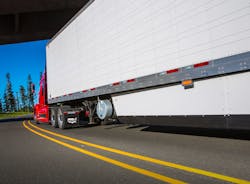Trailer manufacturers to appeals court: ‘Game over for the EPA’
No news is not good news. With the order books open for the 2021 first quarter, trailer manufacturers still do not know if—and how—they are expected to comply with a federal emissions rule set to take effect Jan. 1. A recent court hearing addressed a range of possibilities, but provided no immediate resolution.
At issue is the “Greenhouse Gas Emissions and Fuel Efficiency Standards for Medium- and Heavy-Duty Engines and Vehicles—Phase 2”, a joint effort by the US Environmental Protection Agency and the National Highway Traffic Safety Administration.
The 2016 rule mandates that trailers pull their weight, so to speak, in improving the fuel efficiency of a commercial vehicle. This would entail the use of low rolling resistance tires, aerodynamic devices, etc.—nothing that trailer manufacturers don’t already offer. And the customers who can benefit already buy these.
The catch is that GHG 2 would, in many cases, require the devices whether they provide a fuel efficiency benefit or not—heavy-duty trailers used only for local delivery, for example. So in late 2016 the Truck Trailer Manufacturers Association filed a petition to review the trailer portion of GHG 2 with the D.C. Circuit Court of Appeals.
The EPA, recently under the Trump administration, agreed to review the Obama-era rule and the court granted a stay of its Jan. 1, 2018 implementation.
Then nothing happened, other than EPA's filing the required periodic updates with the court—but those updates said basically EPA hadn’t done anything yet. And that might have been fine with trailer manufacturers for a little while; they could continue with business as usual. But as the calendar rolled into 2020 and the New Year’s 2021 NHTSA deadline loomed, TTMA decided it was time to go back to court to get this settled.
Briefs have been filed by TTMA and the federal agencies, along with intervenor briefs opposing the TTMA petition from, among others, by the California Air Resources Board and a number of other states, the Sierra Club and the Environmental Defense Fund.
Oral arguments in the case were presented to the court Sept. 15.
What's so hard about 'self-propelled'?
TTMA counsel Elisabeth Theodore jumped right in with the basic objection to the EPA rule: Trailers are not “self-propelled vehicles,” a defining term in authorizing emissions regulation under the Clean Air Act, so “that is game over for the EPA.”
And then, to bolster the position, she refers to a brand new (Sept. 14) decision from the IRS regarding taxing towed vehicles that says “the Treasury Department and the IRS do not have the authority to expand the definition of motor vehicles in the final regulations to include vehicles that are not self-propelled.”
But Judge Patricia Millett wanted to know why, when a tractor-trailer is hauling freight down the highway, it can’t be considered a single unit: they’re designed to be operated together.
“When you get to weigh stations, they weigh it together as a single unit,” Millet said.
And if EPA can (and does) regulate the engine as well as the tractor, “why isn't the tractor, for all intents and purposes, the engine that gets attached to the trailer, and then makes the trailer move?” the judge asked.
Except, Theodore said, tractors and trailers come from different manufacturers, are licensed separately, and receive separate certifications for regulatory compliance.
But since the EPA can regulate tractor emissions, suppose they came up with a regulation, based on a computation of an inefficient trailer’s impact on fuel efficiency, that essentially meant no tractor could haul it?
“Everyone knows what's going to happen,” Judge Millet said. “Every trailer manufacturer is going to have to put on the aerodynamics and the tires to get themselves under that limit—otherwise no one's going to be able to pull their trailers.”
TTMA members are “totally fine” with responding to customer demand, Theodore responded—but “Congress didn't intend for trailer manufacturers to bear those costs, and it's clear that it didn't because it used the word ‘self-propelled’.”
NHTSA rule without EPA?
The discussion then focused on what happens to the NHTSA rule if trailers are taken out of the EPA rule. TTMA argued that you can’t have one without the other, and cites other cases regarding “severability”. Essentially, EPA sets the standards, approves the testing and issues certificates of conformity—so how can the NHTSA rule be put into effect?
Well, suggested Judge Justin Walker, why can’t EPA set the rules and do the testing, but enforcement would fall to NHTSA?
Simply, that would mean rewriting the rules: “NHTSA can't outsource its authority to another agency without congressional authority to do that,” Theodore said.
Counsel Thomas Byron III of the Justice Department disagreed.
“The key point here is that all three of those are elements of the compliance mechanism that each agency adopted, with respect to its own requirements,” Byron said. “The fact that NHTSA requires a manufacturer to obtain a certificate of conformity from the EPA, that's merely a mechanism of demonstrating compliance with the fuel efficiency regulation. It's not itself a predicate that requires EPA to have independent regulatory authority under the Clean Air Act to set its own standards.”
But, again on a question from Judge Walker, Byron admitted that if EPA could not issue a certificate of conformity, NHTSA currently does not have an alternative. However, he suggested the court could strike EPA’s authority under the Clean Air Act without taking away the certification requirement.
And that immediately got the attention of Judge Merrick Garland, who wanted to know what authority EPA would have to do that.
NHTSA’s reliance on the existing regulatory framework of another agency is not unusual, Byron replied, a practice that’s meant to “reduce the burden on manufacturers” by NHTSA’s not adopting its own “entirely new burdensome requirements.”
“There's no substantial doubt that NHTSA would have adopted the standards, irrespective of whether it could have relied on EPA testing mechanism,” he said.
Representing the intervenors, EDF Senior Attorney Alice Henderson defended the trailer requirements in the EPA rule because otherwise GHG 2 doesn’t make sense.
“It’s implausible to think that Congress would want to regulate other heavy-duty vehicles that have cargo sections like UPS delivery trucks, but not the cargo section of a tractor-trailer which serves the same purpose—but at a much larger scale, and with greater resulting emissions,” she said.
Rule makes 'zero sense'
Theodore, in TTMA’s closing rebuttal, argued that the Clean Air Act has been around since 1965, and “trailers haven't been regulated at all during that entire time.”
She also pointed out that she’d heard “no response” from the government or intervenors on what the word “self-propelled” could possibly be doing in the statute “if it wasn't intended to exclude trailers.”
“The question is not whether every provision of NHTSA’s rules couldn't function; it's whether striking EPA will impair the function of NHTSA’s rule. It’s very clear that it would,” she said. “I heard no explanation of how a manufacturer could possibly determine whether they comply if they can't get someone to tell them that their trailers comply.
“Trailer manufacturers can't simply plug numbers in the equation, they have to do tests—and the regulations make it very clear that EPA has to pre-approve those tests.”
The NHTSA rule “completely makes zero sense” without the EPA rule, she said.
Regarding the NHTSA implementation deadline, Judge Walker asked if trailer manufacturers are already suffering the “irreparable harm” necessary to warrant a stay, since it’s just mid-September.
“There is irreparable harm going on right now, every day,” Theodore replied, and explained that some manufacturers already need to take orders for early 2021. “And that's why we would ask the court to act as swiftly as it can on this.”
Indeed, no one in the government, it seems, can explain what trailer manufacturers are supposed to do.
“The trailer manufacturers have asked EPA if EPA is going to issue certificates of conformity; EPA said no. The trailer manufacturers have asked EPA if there's anyone they can talk to; EPA said it has no idea.”
What about NHTSA? Judge Millet asked.
“There's no one at NHTSA that will talk to them about what to do," Theodore said.
About the Author
Kevin Jones
Editor
Kevin has served as editor-in-chief of Trailer/Body Builders magazine since 2017—just the third editor in the magazine’s 60 years. He is also editorial director for Endeavor Business Media’s Commercial Vehicle group, which includes FleetOwner, Bulk Transporter, Refrigerated Transporter, American Trucker, and Fleet Maintenance magazines and websites.
Working from Beaufort, S.C., Kevin has covered trucking and manufacturing for nearly 20 years. His writing and commentary about the trucking industry and, previously, business and government, has been recognized with numerous state, regional, and national journalism awards.

